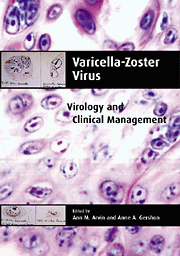Introduction
Published online by Cambridge University Press: 02 March 2010
Summary
Throughout the years, there have been many scientists who have contributed to our knowledge of the varicella zoster virus and the prevention, diagnosis and management of VZV-related diseases. In recent years, four of them, including two Nobel Laureates, have had the distinction of receiving the VZV Research Foundation (VZVRF) Scientific Achievement Award, which recognizes lifetime achievements in VZV research. Established in 1991, the Foundation is the first and only nonprofit organization in the world dedicated to VZV research and education.
Thomas H. Weller, M.D.
Thomas H. Weller, M.D., professor emeritus of the Harvard School of Public Health, Boston, and a Nobel Laureate, was the recipient of the first VZVRF Scientific Achievement Award in 1993. He remarked that his VZVRF award was in a way more gratifying than his Nobel Prize. According to Dr. Weller, “Although my work in isolating and growing the poliomyelitis virus in tissue cultures was the most significant contribution I have made to medical science in terms of global impact, I am most proud of my work with the varicella-zoster virus. It's something I planned to do and worked for years to do.”
It was the work that Dr. Weller and his colleagues did on the poliomyelitis virus that garnered them the Nobel Prize in 1954, and led to the Sabin and Salk vaccines. Likewise, Dr. Weller's work on the varicella-zoster virus led to many important discoveries in VZV research, including Dr. Michiaki Takahashi's development of the varicella vaccine. In 1953, in addition to isolating VZV from cases of chickenpox and zoster, Dr. Weller was able to show that the same virus is responsible for both illnesses.
- Type
- Chapter
- Information
- Varicella-Zoster VirusVirology and Clinical Management, pp. 1 - 6Publisher: Cambridge University PressPrint publication year: 2000

